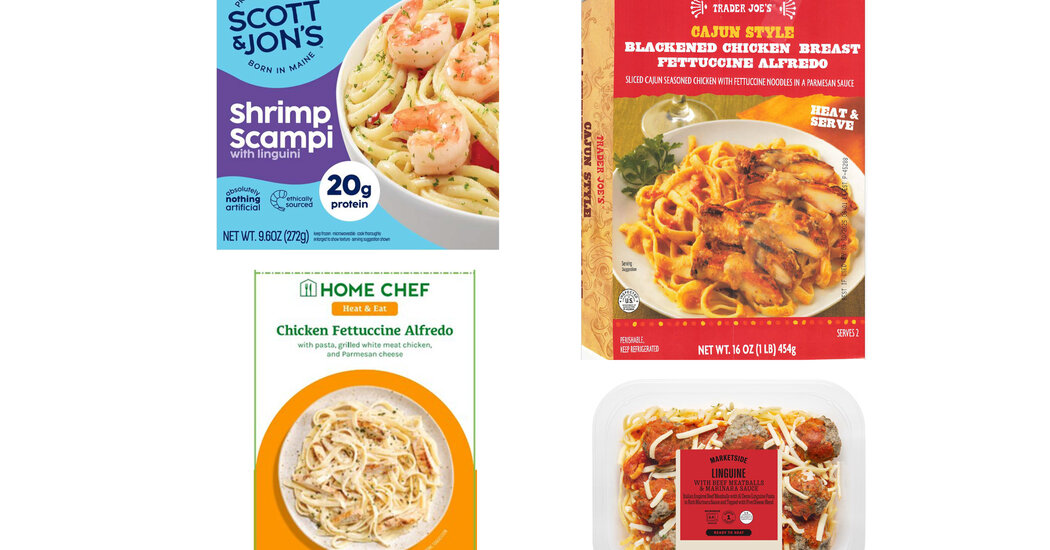Six people have died and at least 27 have become ill after eating prepared pasta meals that were contaminated with listeria and sold at major grocery chains across the country, federal health officials said.
The meals, sold at Albertsons, Kroger, Sprouts Farmers Market, Trader Joe’s and other major stores, were recalled in recent months in connection with the outbreak, which the Centers for Disease Control and Prevention said grew last week. Federal health officials said the supplier, Nate’s Fine Foods Inc., had found Listeria monocytogenes, a bacterium that can cause illness and death, in a sample of its pasta.
Health officials said that people in 18 states had been affected by the outbreak, and that they were working to investigate the source.
Here’s what to know:
The outbreak sickened 27 people in 18 states.
The meals, which included fettuccine, linguine, farfalle and other types of pasta, were sold at major retailers nationwide and were recalled between June and October.
Of the 27 people who became ill, 25 were hospitalized, health officials said. Many of them reported eating precooked meals. In one case, a pregnant woman lost her fetus after becoming ill, health officials said.
The cases were reported in California, Florida, Hawaii, Illinois, Indiana, Louisiana, Michigan, Minnesota, Missouri, North Carolina, Nevada, Ohio, Oregon, South Carolina, Texas, Utah, Virginia and Washington.
“When it comes to listeria outbreaks, this one’s fairly significant and large,” said Benjamin Chapman, a food safety specialist who is the head of the agricultural and human sciences department at North Carolina State University. The number of deaths linked to the outbreak is “tragic,” he added.
In a statement on Sep. 29, Nate’s Fine Foods said that it was “committed to the highest standards of food safety,” and that it was working with the C.D.C., the Food and Drug Administration and state health officials to “fully investigate the source.”
What is listeria?
Listeria monocytogenes is a bacterium that is found naturally in soil, water and animals and can end up in food during the harvesting, processing, preparing and packaging process. It thrives in unsanitary conditions, and it cannot be killed by the cold conditions in a fridge or a freezer.
When people eat food contaminated by Listeria monocytogenes, they may develop a disease called listeriosis, though many do not become seriously ill. Pets can also spread it if they eat contaminated food.
According to the C.D.C., about 1,250 people are infected with listeria each year in the United States, and about 172 die from the infection. The agency describes it as the third leading cause of death from food-borne illness in the country.
In February, about two million baked goods, including some doughnuts and coffee rolls sold at Dunkin’, were recalled over concerns of listeria contamination. The same month, frozen shakes sold to nursing homes, hospitals and other institutions were recalled after the drinks were tied to a yearslong deadly listeria outbreak.
Last year, 10 people died and more than 60 people were sickened after a listeria outbreak that was linked to a Boar’s Head deli meat plant in Virginia. Boar’s Head permanently shut down the plant last September.
What are the symptoms?
Many people infected with listeria have mild illness and will recover on their own after a few days of symptoms, which include diarrhea, vomiting and fever. Others may not get sick at all.
But listeria can be very dangerous for people who are pregnant or over 65 or have weakened immune systems. For people in these groups, listeria can more easily spread from the intestines to the blood and cause serious illness.
Pregnant women with listeria infections typically experience fever, muscle aches and fatigue. Even if these symptoms are mild, infections can lead to miscarriage, premature birth or life-threatening infections in newborn babies.
Other people with serious infections may have flulike symptoms, as well as headaches, stiff necks, confusion, trouble with balance or convulsions.
For those who consume food contaminated with listeria, symptoms can appear the same day or take as many as 10 weeks to develop. But they usually begin within about two weeks, according to the C.D.C.
Do not eat the recalled products.
Health officials are warning people who may have purchased any of the recalled products to check their refrigerators and freezers for the meals — and not to eat them.
It’s also wise to clean refrigerators, containers and any other surfaces that the affected foods may have touched; listeria can survive in the fridge and easily spread to other foods and surfaces.
Anyone with symptoms should contact a doctor and report them to the F.D.A.
Livia Albeck-Ripka is a Times reporter based in Los Angeles, covering breaking news, California and other subjects.
Alice Callahan is a Times reporter covering nutrition and health. She has a Ph.D. in nutrition from the University of California, Davis.
The post Six Dead and 27 Sickened in Listeria Outbreak Linked to Pasta appeared first on New York Times.




